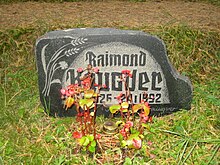Raimond Kaugver
Raimond Kaugver (born February 25, 1926 in Rakvere , † January 24, 1992 in Tallinn ) was an Estonian writer .
life and work

Raimond Kaugver was born into the family of an accountant in Rakvere, Central Estonia. From 1937 to 1943 he attended the Progymnasium and the Gymnasium in Rakvere. In 1943, during the German occupation of Estonia , he fled from forced recruitment to Finland . There he fought as an Estonian volunteer in the Continuation War against the Soviet Union . In 1944 he returned to Estonia and continued to fight the Red Army on the German side . He was taken prisoner by the Soviets.
From 1945 to 1949 Kaugver was interned in a labor camp near Vorkuta north of the Arctic Circle (then the Autonomous Soviet Socialist Republic of the Komi ). He later summarized his memories of this time in the memoir-like short prose collection Kirjad laagrist (1989).
In 1949 Kaugver was allowed to return to his Estonian homeland. From 1950 to 1961 he was employed by the Tallinn tram. He later made his living as a miner, deputy director of a vacation home and in the theater.
From 1964 Kaugver worked as a freelance writer. However, many of his works could not appear until the end of the 1980s or after Estonian independence was restored. The productive Kaugver deliberately wrote some things for the drawer. For example, in his novel Nelikümmend küünalt ("Forty Candles"), written in 1966, he dealt with the fate of his generation during and after the Second World War . The book with its strongly autobiographical elements could not appear until 1995.
In addition to numerous prose texts, Kaugver has written over twenty radio plays for Estonian radio and several plays.
Raimond Kaugver has found his final resting place in the Tallinn Forest Cemetery .
Works (selection)
Novels
- Keskpäevavalgus (1962)
- Igapäevane body (1964)
- Seitsmendas Läänes (1965)
- Jumalat egg ole kodus (1971)
- Ja kõik on kuhugi teel (1974)
- Suurte arvude seadus (1978)
- Disco (1982)
- Vana mees tahab koju (1983; filmed in 1991)
- Meie pole süüdi (1984; German "What does it mean here guilty?", 1990; filmed in 1986 under the title Õnnelind flamingo )
- Pariisi lõbusad naised (1985)
- Tee isa juurde (1987)
- Kas ema südant tunned sa? (1988)
- Laev keset rägastikku (1990)
- Postural rehabiliteeritud (1990)
- Peotäis tolmu (1992)
- Laevad kaotavad tüüri (posthumously 1993, written 1951)
- Nelikümmend küünalt (posthumously 1995, written 1966)
- Sillad põlevad (short novel, posthumous 2007)
- Põhjavalgus (posthumously 2010)
Collections of short stories and short stories
- 60 minutes (1968)
- Tuuleveskid (1974)
- Külalisteraamat (1977)
- Oh mis kena maailm (1983)
- Kirjad Laagrist (1989)
narrative
- Keerdtrepp (1976)
Plays
- Granny saar (1970)
- Rong väljub hommikul (1971; German "Trains run in the morning", 1980)
- Saturnuse lapsed (1989)
Awards
In 1989 Kaugver received the renowned Friedebert Tuglas Prize for his novella Elupäästja (“The Lifesaver ”) .
Secondary literature
- Cornelius Hasselblatt : History of Estonian Literature. Berlin, New York 2006 ( ISBN 3-11-018025-1 ), pp. 612 and 726
Web links
- Works by Raimond Kaugver in the holdings of the Estonian National Library
- CV (Estonian)
- Raimond Kaugver in the Internet Movie Database (English)
Individual evidence
- ↑ http://www.ohtuleht.ee/192530
- ↑ Eesti elulood. Tallinn: Eesti Entsüklopeediakirjastus 2000 (= Eesti Entsüklopeedia 14) ISBN 9985-70-064-3 , p. 149
| personal data | |
|---|---|
| SURNAME | Kaugver, Raimond |
| BRIEF DESCRIPTION | Estonian writer |
| DATE OF BIRTH | February 25, 1926 |
| PLACE OF BIRTH | Rakvere |
| DATE OF DEATH | January 24, 1992 |
| Place of death | Tallinn |